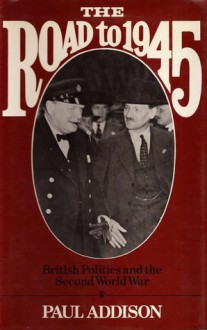1940 has gone down in history as the time when political parties and factions put aside their differences to close ranks under Churchill and focus on the task of war. Paul Addison effectively argues that this, 'their finest hour', when party warfare was suspended, was also a time when power...
show more
1940 has gone down in history as the time when political parties and factions put aside their differences to close ranks under Churchill and focus on the task of war. Paul Addison effectively argues that this, 'their finest hour', when party warfare was suspended, was also a time when power shifted firmly towards the Left. At the top, the Conservative wing of the Coalition began to accept many of Labour's aspirations for the future. At the same time, popular opinion moved sharply against the Conservatives, ensuring Attlee's amazing victory at the 1945 election. A radical change had taken place.
A long-established regime of 'safety-first' Conservatives had given way in catastrophe to a dynamic combination: Winston Churchill and the Labour Party. Plucking the future from the ruins, Keynes, Butler, Bevin, Morrison and above all Beveridge exploited the circumstances of the hour to promote the largest programme of domestic reform since the Liberal era of 1905-14. Within the Coalition Government a new consensus of social democracy was founded which endured long after the last bomb had fallen. Dr Addison concludes that Churchill's part in the movement for change was 'richly ambiguous': he frequently neglected the Tories to the advantage of Labour. The Labour Ministers hitherto largely untried in power, schooled themselves in government, and Attlee as Deputy Prime Minister had the chance to 'rehearse the premiership' whenever Churchill was away.
Addison maintains that the origin of change lay in the dark period between Dunkirk in 1940 and El Alamein in 1942. The same is true, he believes, of the swing of popular feeling against the Conservatives. He maintains that the influence of left-wing propaganda, spread through such channels as the press and the Army Bureau of Current Affairs, has been exaggerated. But, together with the egalitarian emphasis of 'the people's war', it helps to explain Labour's decisive victory at the polls in 1945.
With expert use of published and unpublished sources, Dr Addison has assiduously traced the impact of war on British politics. He has also powerfully recaptured the spirit of reconstruction -- the growing conviction that, having fought as one people, the British could rebuild their nation in a spirit of optimism and agreement.
show less

